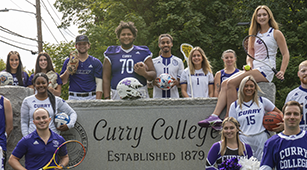Schedule an appointment to meet with Career & Experiential Learning about your area of interest.
Make an AppointmentContact Accessibility Services
- 617-333-2385 (P) 617-333-2990 (F)
- accessibilityservices@curry.edu
- Learning Commons, S-104
Per the Americans with Disabilities Act Amendments Act (2008), a disability or chronic condition is defined as a permanent, long standing, significant condition that substantially or significantly limits one or more of life’s major functions.
To assess a student’s disability related needs, and which accommodations will provide equal access, documentation should be less than three years old, and/or must include adult age testing. Typically, a student will not be asked for a reevaluation during matriculation, however, updated documentation may be required if aspects of the student’s diagnosis are variable (i.e., some psychiatric disabilities, some health conditions), or if housing, transportation, or parking accommodations are requested.
The determination of reasonable and appropriate accommodation(s) is based on the types of functional limitations manifested by a particular disability, as reflected by supporting documentation and other information, and may differ for each student. Accommodations will be determined on an individual basis and may not be identical to those previously utilized by the student. Accommodations that compromise the integrity of an academic program, impose an undue financial and/or administrative burden on the University, or fundamentally alter programmatic content are neither reasonable nor appropriate. Accessibility Services will evaluate and determine the appropriateness of all supporting documentation on a case by case basis. We may also request additional information to establish eligibility for accommodations.
A credentialed provider, specialist, or examiner is an individual with expertise in the diagnosed condition, who is qualified to provide detailed, supporting information about a current disability or chronic condition. They are expected to provide explanations and recommendations of medically necessary accommodations that will support the otherwise qualified student’s equal access.
The recommendations made by clinicians are weighed heavily in determinations of accommodations but are not binding in nature. The final determination of admissible and complete documentation rests with the institution. Accessibility Services reserves the right to disagree/override a recommendation made due to, but not limited to:
- Differences in learning environments
- Differences in missions from K-12 special education services and higher education
- Lack of application between disability and recommendation
Documentation Guidelines
Documentation must come from a licensed or credentialed provider or evaluator, whose certification or expertise is specific to the disability or diagnosed condition.
- Documentation must include: A clear diagnostic statement, including diagnostic sub-types where relevant.
- A description of the condition and detailed information on the functional impact it causes. A full clinical description will convey this information, as well as diagnostic codes from the DSM (Diagnostic Statistical Manual of the American Psychiatric Association) or the ICF (International Classification of Functioning, Disability and Health of the World Health Organization).
- A description of the student’s current functional needs. Quality documentation will demonstrate how a major life activity is substantially limited by indicating evidence of frequency and pervasiveness in the environment. This information helps to determine what reasonable accommodations are necessary and appropriate.
- A description of the progression or stability of the disability over time and in context.
- Recommendations for college appropriate accommodations. Reasonable accommodations do not include fundamental alterations to course or academic program requirements. Furthermore, accommodations cannot be made that would effectively place an undue administrative or financial burden on Curry. If a requested accommodation presents an undue burden or makes a fundamental alteration, Curry will attempt to propose alternative solutions and/or accommodations which do not create such hardship or make such alteration. Curry will work in good faith with the person making the request to determine the availability of an acceptable alternative.
- IEP and 504 Plans contain valuable historical information about accommodations in K-12. However, most of these plans do not include diagnostic information, therefore, we may request additional documentation in order to make accommodation decisions.
Inadmissible Documentation
The following items are inadmissible as documentation of a disability:
- medication prescription
- medical excuse or patient aftercare notes
- evaluations from elementary or middle school
- documentation written by a family member
- unsigned documentation
- photographs and x-rays of a physical condition
- incomplete Accessibility Services forms
- documentation without the provider’s contact information
- letters or forms that do not include a disability or formal diagnosis
- documentation older than three years
Eligibility Process
Documentation:
- Provide documentation that meets our documentation guidelines. Please carefully review the information and note that submitting incomplete or partial documentation could delay the process.
- Please note that documentation shared with Admissions or submitted with a college application is not shared with Accessibility Services and will have to be sent directly to us.
- Students who do not have documentation or are in the process of obtaining it, may participate in a consultation meeting with Accessibility Services to discuss next steps.
Meeting:
During the intake appointment, students will have the opportunity to learn more about Accessibility Services, accommodations, disclosure and available resources at Curry College. The student and Accessibility Services will discuss and review the accommodations request, documentation, and eligibility.
- Please reach out to Accessibility Services to schedule an intake appointment. Accessibility Services can be reached by email at accessibilityservices@curry.edu or by phone at 617-333-2385.
- Please contact Accessibility Services if there are any questions or concerns regarding documentation.
- Appointments are available between 9:00 a.m. and 4:00 p.m., Monday thru Friday.
Transition from High School to Higher Education
The transition from high school to higher education poses significant challenges for almost every incoming freshman. But for students requiring disability accommodations, it can be especially confusing, since laws that govern the rights and responsibilities of both students and academic institutions differ substantially between K-12 and post secondary education.
The Office of Accessibility Services is here to help students understand these differences and guide them through the transition process to ensure all educational access needs are met at Curry College.
Student Responsibilities
In higher education, students are responsible for disclosing their disabilities to designated college officials or department(s) and requesting accommodations, as well as obtaining the appropriate supporting documentation and providing it to the school. Throughout this process, both before and after approval, the students themselves are responsible for the interactive process or actively engaging with the Accessibility Services office.





